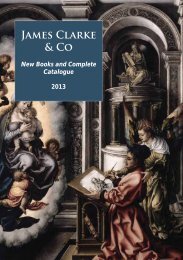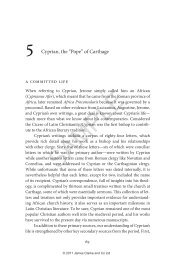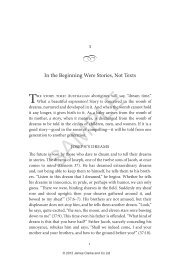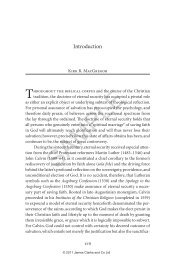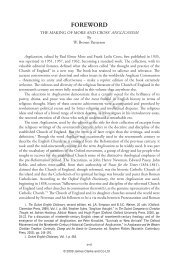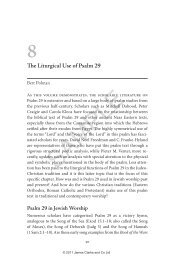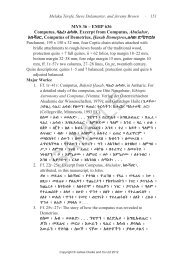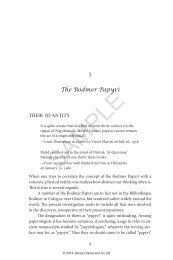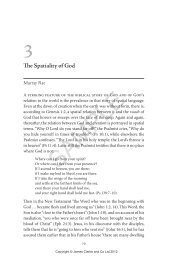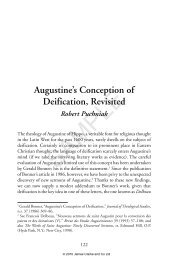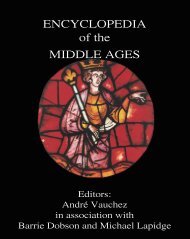Extract from Chapter 1 - James Clarke and Co Ltd
Extract from Chapter 1 - James Clarke and Co Ltd
Extract from Chapter 1 - James Clarke and Co Ltd
You also want an ePaper? Increase the reach of your titles
YUMPU automatically turns print PDFs into web optimized ePapers that Google loves.
64 MUSING WITH CONFUCIUS AND PAUL<br />
<strong>Co</strong>nfucius thought that Heaven was delegating to him the task of<br />
rebuilding the culture of Zhou. 22<br />
These two interpretations can be seen as mutually compatible: “<strong>Co</strong>nfucius<br />
was the repository of knowledge about this culture <strong>and</strong> he displayed it in<br />
his personal conduct. . . .” 23 Today we might use the words “civilized”<br />
<strong>and</strong> “cultured” to describe the meanings of wen in the Analects, while<br />
using the word “culture” anthropologically to refer to stylized ways of<br />
living. I will pick up this discussion in the section below on “culture <strong>and</strong><br />
cultured.”<br />
The Analects <strong>and</strong> the Scholarly Tradition<br />
of Learning to Becoming Human<br />
The <strong>Co</strong>nfucian culture is the context in which the Chinese human character<br />
has been shaped. <strong>Co</strong>nfucius believed that human beings are born<br />
with similar natures, but they drift apart through repeated practices<br />
caused by educational <strong>and</strong> environmental influences (Analects 17:2).<br />
<strong>Co</strong>nfucius founded the rujia, “the scholarly tradition” or the “Learning<br />
School,” 24 <strong>and</strong> emphasizes studying as the way to becoming fully human<br />
(cf. Analects 15:9). <strong>Co</strong>nfucius advocates wide learning in wen (culture),<br />
in order to become an exemplary person (junzi) who disciplines himself<br />
with li (ritual propriety). Such a person will not likely go astray (Analects<br />
6:27).<br />
The scholarly tradition of <strong>Co</strong>nfucianism believes that teachers are<br />
life-long learners who keep reviewing <strong>and</strong> preserving the old <strong>and</strong> acquiring<br />
the new (Analects 2:11). To be a great teacher, one takes the historical<br />
<strong>and</strong> prophetic task of knowing the classics well <strong>and</strong> transmitting them to<br />
the contemporary audience. Analects 7:1 says: “I transmitted <strong>and</strong> did not<br />
SAMPLE<br />
22. For more interpretative discussion on these verses, see Yang, Lunyu Yizhu, 104,<br />
194; Qian, Lunyu Xinjie, 165, 307; Chen, <strong>Co</strong>nfucian Analects, 72, 154; Slingerl<strong>and</strong>, trans.,<br />
<strong>Co</strong>nfucius Analects, 87–88.<br />
23. Ivanhoe, “Whose <strong>Co</strong>nfucius? Which Analects?” 131, n. 9: “Other plausible interpretations<br />
exist, as well. For example, Liu Xie (465–522) in the second chapter of his<br />
Wenxin diaolong says that <strong>Co</strong>nfucius’ wenzhang is his “style of composition” (wenci).<br />
Huang Kan (488–545) in his commentary on the Analects identifies wenzhang as the six<br />
classical works (liuji).”<br />
24. On ru, rujia <strong>and</strong> its legacy, see Eno, The <strong>Co</strong>nfucian Creation of Heaven, 190–97;<br />
Jensen, Manufacturing <strong>Co</strong>nfucianism, Part 2.<br />
© 2008 <strong>James</strong> <strong>Clarke</strong> <strong>and</strong> <strong>Co</strong> <strong>Ltd</strong>



